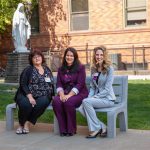Located just outside of Pittsburgh, Braddock has the second-highest number of senior citizens living alone and in poverty in Allegheny County. In under-served communities, two of the most vulnerable population groups are older adults and young children.
 A summer nutrition program created by students from the University of Pittsburgh Graduate School of Public Health aims to combat this problem by offering a free, balanced lunch to both young children and older adults who otherwise may not be able to afford one.
A summer nutrition program created by students from the University of Pittsburgh Graduate School of Public Health aims to combat this problem by offering a free, balanced lunch to both young children and older adults who otherwise may not be able to afford one.
Called “Assembly of the Ages,” an inaugural event organized with local non-profit Heritage Community Initiatives brought together people under the age of 18 and over 55 for an afternoon of games and activities while they enjoyed a gourmet, chef-prepared lunch. At the event on July 18, seniors and children bonded as they wrote down personal goals in areas of wellness, nutrition, activities and social interaction. After lunch, seniors watched as the children played a game of kickball.
“The purpose of the program is to make sure families don’t have to make the difficult choice between paying a bill in the summer or putting food on the table for their children,” said Laura Kelley, director of business development at Heritage Community Initiatives, which serves about 50 meals and snacks daily in the summer to children in Braddock who qualify for the free lunch program during the school year.
The Assembly of Ages initiative was led by two interns through Bridging the Gaps, a program run out of Pitt Public Health. Bridging the Gaps promotes public health in under-served communities and trains health service professionals. Every year, it recruits future clinicians for an internship program where they are assigned to lead a project that will directly impact the community and have lasting effects after the summer ends.
This summer, Bridging the Gaps interns Amy Zahn from Pitt School of Pharmacy and Lan Pham from Pitt School of Nursing wanted a hands-on experience to get a better understanding of what patients may fa ce in their daily lives.
ce in their daily lives.
“As future health care providers, we need to understand all the aspects that go into our patients’ care,” Zahn said. “The daily stressors will affect how somebody views their health, and through this internship, we’re learning exactly what those stressors are and why some [patients] may not be as adherent as we would like them to be.”
After hosting two Assembly of the Ages events, Zahn and Pham collected data and created a final project advising Heritage Community Initiatives on activities that will keep the children working toward their goals. Ultimately, Heritage Community Initiatives wants to routinely incorporate senior citizens into its program. Zahn and Pham are creating a plan to keep the lunches going throughout the year through the Heritage Grandparents Program.
“It’s a great way to bring the kids and seniors together,” said Shiane Prunty, community volunteer. “Some kids don’t have ideal parenting so this gives them some love, guidance and even helps teach them manners.”









